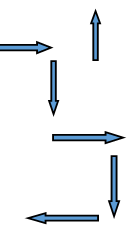As a language, English is enriched with a lot of multi-faceted expressions that explain its pervasiveness around the world. In it, verbal constructions describing things and feelings are ‘slippery.’ English expressions can be applied across a range of applications that can be a considerable distance from their original meanings. This is an advantage English shares with only some other languages, where anyone can reuse words and phrases and make them their own. In musical terms, English is like jazz. Both become more interesting when a user learns to “bend the notes.”
So it is with the useful and common expression, “lost in the weeds,” usually meaning that a discussion has strayed way off course. Surprisingly, students of colloquial expressions don’t agree on its origins. But I suspect it relates to the sinking feeling of hitting a golf ball that has ended up somewhere in the tall grass beyond the fairway. There isn’t much that is more annoying than trying to find and then hit a tiny object embedded at the base of tall weeds that have learned to stand their ground. A shot from that location is not so much a part of the game as a separate bit of excavation attempted with all the wrong tools.
But then, “lost in the weeds” could also be a farmer’s phrase, referring to huge fields of tall grain hiding an implement. And someone online is sure it’s a pilot’s expression for overshooting a runway: as good a demonstration as any of the plasticity of English expressions.
Whatever its origins, it has always been useful because my undisciplined mind tends to meander a considerable distance away from the original point I wanted to make. The phrase is a good way to admit straying off course. Or I would hear students take flight into the same kind of verbal free-lancing, pointing listeners toward oblivion. The phrase seems like a nicer way to remind them to get back to their point.
 All of this came to mind last week reading a book review in the New York Times, where the reviewer chided an author for wandering ‘into the weeds.’ The book on the great transcendentalists apparently didn’t get around to the key figures of Ralph Waldo Emerson or Henry David Thoreau until the second half. Instead, it seems that many early pages focused on the town of Concord Massachusetts, while other pages featured an extended discussion of the origins of the ordinary pencil. Then, this reviewer’s peculiar observation follows after he uses the phrase:
All of this came to mind last week reading a book review in the New York Times, where the reviewer chided an author for wandering ‘into the weeds.’ The book on the great transcendentalists apparently didn’t get around to the key figures of Ralph Waldo Emerson or Henry David Thoreau until the second half. Instead, it seems that many early pages focused on the town of Concord Massachusetts, while other pages featured an extended discussion of the origins of the ordinary pencil. Then, this reviewer’s peculiar observation follows after he uses the phrase:
“The phrase ‘lost in the weeds’ is only an insult when it assumes one doesn’t want to be there.” He then goes on to note that these long diversions seemed to be intentional. He wants to believe that the writer had reasons to seemingly wander off topic.
I don’t want to split hairs too finely here, but it is what rhetoricians do. The point is clear: the book’s author was not “lost” at all. One shouldn’t presume a book has gone off course and then assert that the author probably had his reasons.
The lesson here is to muster the small amount of reasoned consistency required to carry through with the spirit of a popular turn of phrase. Even this wonderful little analogy about wandering off course requires a nimble and, yes, disciplined mind. This requirement means that there is usually some mental fog present in asserting that one is ready to “bite the bullet and delay a decision,” or “expect to always hit home runs every time the ball is snapped.”
![]()



